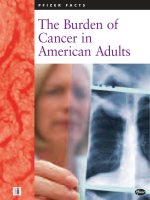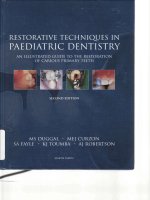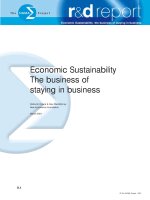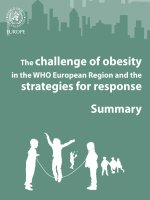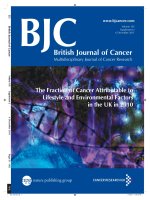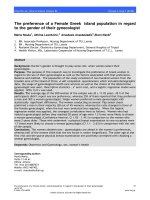Responding to the challenge of cancer in Europe pdf
Bạn đang xem bản rút gọn của tài liệu. Xem và tải ngay bản đầy đủ của tài liệu tại đây (1.96 MB, 361 trang )
Responding to the challenge of cancer in Europe
© Institute of Public Health of the Republic of Slovenia, 2008
All rights reserved. Please address requests for permission to reproduce or translate this publication to:
Institute of Public Health of the Republic of Slovenia
Trubarjeva 2
1000 Ljubljana
Slovenia
The views expressed by authors or editors do not necessarily represent the decisions or the stated policies
of the Ministry of Health of the Republic of Slovenia, the European Commission, or the European
Observatory on Health Systems and Policies or any of its partners.
CIP – Cataloguing in publication
National and University Library, Ljubljana, Slovenia
616-006(4)
RESPONDING to the challenge of cancer in Europe / edited by
Michel P. Coleman [et al.]. - Ljubljana : Institute of Public Health of the Republic of Slovenia, 2008
ISBN 978-961-6659-20-8
1. Coleman, Michel P.
COBISS.SI-ID 236838144
Printed and bound in the Republic of Slovenia by Tiskarna Radovljica
Further copies of this publication are available from:
Institute of Public Health of the Republic of Slovenia
Trubarjeva 2
1000 Ljubljana
Slovenia
Responding to the challenge of
cancer in Europe
Edited by Michel P Coleman, Delia-Marina Alexe, Tit Albreht
and Martin McKee
This publication arises from the project FACT – Fighting Against Cancer
Today – which has received funding from the European Union, in the
framework of the Public Health Programme.
Foreword xiii
Zofija Mazej Kukovic
Acknowledgements xv
About the contributors xvii
Chapter 1 Responding to the challenge of cancer in Europe 1
Delia-Marina Alexe, Tit Albreht, Martin McKee and Michel P Coleman
Chapter 2 The burden of cancer in Europe 7
Freddie Bray
Chapter 3 The causes of cancer and policies for prevention 41
Jose M Martin-Moreno and Gu∂jón Magnússon
Chapter 4 Cancer screening 69
Matti Hakama, Michel P Coleman, Delia-Marina Alexe and Anssi Auvinen
Chapter 5 Drugs for cancer 93
Karol Sikora
Chapter 6 Organizing a comprehensive framework for cancer control 113
Robert Haward
Chapter 7 Changes in the management of cancer: the example 135
of colorectal cancer
Jean Faivre and Côme Lepage
Contents
ˆ
–
Chapter 8 Survival of European cancer patients 151
Franco Berrino and Riccardo Capocaccia
Chapter 9 Information on cancer 177
Andrea Micheli and Paolo Baili
Chapter 10 Cancer patients - partners for change 191
Hildrun Sundseth and Lynn Faulds Wood
Chapter 11 The role of psychosocial oncology in cancer care 209
Luigi Grassi and Luzia Travado
Chapter 12 Dying with cancer, living well with advanced cancer 231
Irene J Higginson and Massimo Costantini
Chapter 13 Closing the gap: cancer in central and eastern Europe 253
Witold Zatonski and Joanna Didkowska
Chapter 14 Cancer control in Slovenia: achievements, shortcomings and 279
opportunities
Maja Primic Zakelj and Tina Zagar
Chapter 15 Researching cancer 297
Tanja Cufer and Richard Sullivan
Chapter 16 Making progress against cancer 315
Tit Albreht, Martin McKee, Delia-Marina Alexe, Michel P Coleman
and Jose M Martin-Moreno
´
ˆ
ˆ
ˆ
Responding to the challenge of cancer in Europe
vi
List of tables, figures and boxes
Tables
Table 2-1 Estimated number of new cases (incidence) and deaths 14
(mortality) in 2006 for the 17 most common cancers in the
European Union of 25 Member States, and for the 5 most
common cancers in Greater Europe, sorted in descending
order of new cases
Table 2-2 Estimated number of new cancer cases and deaths, 20
by country, greater Europe 2002
Table 2-3a Predicted numbers (thousands) of new cancer cases in 36
2020 in Europe, based on incidence rates in 2002
Table 2-3b Predicted numbers (thousands) of new cancer cases in 37
2020 in Europe, based on crude scenarios for annual
change in the overall cancer incidence rates
Table 4-1 Components of cancer screening programmes 73
Table 4-2 Randomized trials evaluating mortality effects of 78
mammography screening
Table 4-3 Randomized trials evaluating mortality effects of colorectal 82
cancer screening based on faecal occult blood testing
Table 4-4 Summary of evidence for cancer screening 88
Table 4-5 Cancer screening recommendations by various organizations 89
Table 5-1 The challenges of cancer care 97
Table 5-2 Drivers of molecular therapeutics 99
Table 5-3 Uncertainty of novel drugs for cancer 100
Table 5-4 Barriers to innovation 103
Table 5-5 High-cost cancer drugs likely to be approved by the Food 107
and Drug Administration (FDA) and EMEA, 2007-2010
Table 8-1 Population coverage, number of adult cancer patients 154
diagnosed 1995-99 and included in analyses, proportion of
microscopically verified tumours and proportion of patients
who were followed-up for less than five years of diagnosis:
EUROCARE-4, by country
Table 8-2 Relative survival (%) at one and five years after diagnosis, 158
and five-year survival among patients who had already
survived at least 1 year, by country, selected cancers:
EUROCARE-4, adults (15-99 years) diagnosed 1995-99
Table 8-3 Five-year relative survival (%) for selected cancers in adults: 166
Europe (EUROCARE data) and the USA (SEER data): period
analysis for 2000-2002
Table 9-1 Relative risk between maximum and minimum levels of 177
incidence rates, mortality rates and 5-year relative survival
across Europe: for all cancers combined
Table 9-2 Indicators of progress in cancer control (EUROCHIP-1) 180
Table 9-3 Cancer registries in Europe 182
Table 11-1 Psychological morbidity and risk factors for psychosocial 212
morbidity in cancer patients
Table 11-2 Summary of key recommendations of NICE clinical guidance 223
on supportive and palliative care
Table 11-3 Main domains of the patient-centred model 224
Table 12-1 Deaths from cancer in Europe and selected other parts of 231
the world: 2000 and predicted for 2020
Table 12-2 Cancer patients: prevalence of symptoms and estimated 235
number of cancer patients with symptoms towards the end
of life
Table 12-3 Summary of results from a meta-analysis of a multiprofessional 247
palliative care team compared with conventional care.
Description of the effect size for different patient outcomes
Table 13-1 Contribution (years of life) of selected causes of death to the 256
difference in expectation of life at birth between central and
eastern Europe and EU15, 2002
Table 13-2 Cancer incidence and mortality rates (per 100 000) in 257
Europe, 2002
Table 13-3 Number of alcohol-related deaths and rates per 100 000 262
population in central and eastern Europe, 2002
Table 13-4 Number of alcohol-related deaths and rates per 100 000 263
population in EU15, 2002
Table 14-1 Burden of cancer in Slovenia, 1992-1994 and 2002-2004 280
Table 15-1 Global investment in cancer research 306
Responding to the challenge of cancer in Europe
viii
Figures
Figures marked * appear in the colour section (CS) between pages 40 and 41.
Figure 2-1 Availability of cancer mortality data by country (Source: WHO 10
mortality database)
Figure 2-2 United Nations definition of the 38 countries and 4 regions of 13
Europe (Source: WHO)
Figure 2-3 Distribution of new cases and deaths, by sex, for 23 different 16
cancers in Europe, 2002 (Source: Ferlay et al, 2004)
Figure 2-4 Distribution of age-standardized (world) rates (ASR) of cancer 17
incidence and mortality, by country and sex, in descending
order of incidence – all cancers except skin (Source: Ferlay
et al, 2004)
Figure 2-5 Distribution of age-standardized (world) rates (ASR) of 21/22
incidence and mortality, by country and sex, in descending
order of incidence – lung cancer males (a) and females (b)
(Source: Ferlay et al, 2004)
Figure 2-6a Distribution of age-standardized (world) rates (ASR) of 24
incidence and mortality by country, in descending order
of incidence – breast cancer (Source: Ferlay et al, 2004)
Figure 2-6b Distribution of age-standardized (world) rates (ASR) of 25
incidence and mortality (ASR) by country, in descending order
of incidence – prostate cancer (Source: Ferlay et al, 2004)
Figure 2-7 Distribution of age-standardized (world) incidence and 26/27
mortality rates (ASR) by country and sex, in descending order
of incidence – colorectal cancer males (a) and females (b)
(Source: Ferlay et al, 2004)
Figure 2-8a* Trends in age-standardized (world) mortality rates in CS
selected countries in the four UN-defined regions of Europe –
all cancers combined, males (Source: WHO mortality database)
Figure 2-8b* Trends in age-standardized (world) mortality rates in selected CS
countries in the four UN-defined regions of Europe – all cancers
combined, females (Source: WHO mortality database)
Figure 2-9a* Trends in age-standardized (world) mortality rates in selected CS
countries in the four UN-defined regions of Europe – lung cancer,
males (Source: WHO mortality database)
Figure 2-9b* Trends in age-standardized (world) mortality rates in selected CS
countries in the four UN-defined regions of Europe – lung cancer,
females (Source: WHO mortality database)
List of tables, figures and boxes ix
Figure 2-10 Stages of worldwide tobacco epidemic (Source: Edwards, 31
2004; adapted from Lopez, Collishaw & Piha, 1994)
Figure 2-11 Female lung cancer mortality, Spain 1974-2003 (solid line) 31
and predicted (dashed line) until 2020, based on age-period-
cohort model (Source: Nordpred, Møller et al, 2003)
Figure 2-12 Trends in smoking prevalence in the EU 1979-2002 32
(Source: Cancer Research UK, EU Factsheet, 2004)
Figure 2-13* Trends in age-standardized (world) mortality rates in CS
selected countries in the four UN-defined regions of Europe:
breast cancer, females (Source: WHO mortality database)
Figure 2-14a* Trends in age-standardized (world) mortality rates in CS
selected countries in the four UN-defined regions of Europe –
colorectal cancer, males (Source: WHO mortality database)
Figure 2-14b* Trends in age-standardized (world) mortality rates in CS
selected countries in the four UN-defined regions of Europe –
colorectal cancer, females (Source: WHO mortality database)
Figure 2-15* Trends in age-standardized (world) mortality rates in CS
selected countries in the four UN-defined regions of Europe –
prostate cancer (Source: WHO mortality database)
Figure 5-1 Chemotherapy for advanced cancer 96
Figure 5-2 Predicted new drug application (NDA) dates for molecular 98
therapies in the United States of America
Figure 5-3 Global cancer market by sector: the escalating global cost of 101
cancer drugs
Figure 5-4 The future of cancer drug development 102
Figure 5-5 Six areas where diagnostics help to personalize cancer medicine 102
Figure 5-6 Annual spend per person (€) on cancer drugs in the EU in 104
2004 (purchasing power parity adjusted)
Figure 5-7 Marketed targeted therapies and their costs (in thousands 106
of Euros)
Figure 5-8 The four building blocks of cancer’s future 110
Figure 8-1 Mean age-adjusted five-year relative survival, adults 157
(15-99 years) diagnosed during 1995-99 in one of 23
European countries: EUROCARE-4 study
Responding to the challenge of cancer in Europex
Figure 8-2 Age-adjusted five-year relative survival in adults 160
(15-99 years) diagnosed during 1995-99 in one of 23
European countries, both for all patients and for those who
survived to the first anniversary of diagnosis (one-year survivors),
EUROCARE-4 study: (a) colorectal cancer (b) breast cancer in
women (c) prostate cancer
Figure 8-3 Five-year relative survival in adults (15-99 years) diagnosed 161
during 1995-99, by geographic region and by age at diagnosis,
both for all patients and for those who survived to the first
anniversary of diagnosis (one-year survivors), EUROCARE-4
study: (a) colorectal cancer (b) breast cancer in women (c)
prostate cancer
Figure 8-4 Trends in five-year age-adjusted relative survival in adults 163
(15-99 years) by geographic region, period estimates for
1991-2002 (see text), EUROCARE-4 study: (a) colorectal
cancer (b) breast cancer in women (c) prostate cancer
Figure 8-5 Age-adjusted five-year relative survival for all cancers 164
combined, by sex and country, with area-weighted mean
survival for Europe, grouped by Total National Expenditure
on Health
Figure 8-6 Trends in five-year and ten-year age-adjusted relative 167
survival in adults (15-99 years) in Europe, period estimates
for 1991-2002 (see text), EUROCARE-4 study: all cancers
combined, by sex
Figure 9-1 Age-standardized total prevalence, incidence and survival, 187
both sexes, all cancers combined, 1992
Figure 11-1 Distress thermometer proposed by the NCCN Panel on 216
Distress Management in Oncology
Figure 12-1 Hypothesized trajectories of functional decline in cancer 234
and other conditions (which may now represent the cancer
trajectory)
Figure 12-2 Preliminary data on place of death by country 241
Figure 12-3 Model derived from a systematic review (including 1.5 million 241
patients) of the factors associated with home or hospital death
Figure 12-4 Results of two ecological studies in Genoa (top) and London 242
(bottom) to analyse the relationship between the proportion of
people who died at home and social indicators
Figure 12-5 Model of palliative care as an increasing part of care from 248
diagnosis onwards
List of tables, figures and boxes xi
Responding to the challenge of cancer in Europexii
Figure 13-1 Trends in mortality in Europe from major causes at ages 20-64 254
Figure 13-2 Time trends and predicted cancer mortality in the EU 258
Figure 13-3 Smoking-attributable death rates from all cancers in 261
EU countries
Figure 13-4 Cervical cancer mortality 265
Figure 13-5 Breast cancer mortality 266
Figure 13-6 Colorectal cancer mortality 267
Figure 13-7 Testicular cancer mortality 268
Figure 14-1 Trends in age-standardized cancer incidence and mortality 281
rates by sex in Slovenia, 1985-2004
Figure 14-2 Burden of cancer by site and sex, Slovenia 2004 282
Figure 14-3 Distribution (%) of cancers by age and sex, Slovenia, 2004 283
Figure 14-4 Five-year relative survival (95% CI) for selected cancers 285
among males in Slovenia during the period 2000-2004
Figure 14-5 Five-year relative survival (95% CI) for selected cancers 286
among females in Slovenia during the period 2000-2004
Figure 15-1 Spend per capita for cancer research in the EU15; 304
EU25+EFTA; and United States – from funding organizations
(governmental and philanthropic) and through health-care/
university systems
Figure 15-2 Outputs (publications) from top 24 pharmaceutical 308
companies in the United States of America and EU25+EFTA,
1996-2003
Figure 15-3 Comparison of global outputs (publications) in cancer 308
research 1999 and 2003
Boxes
Box 10-1 MAC Recommendations 197
Box 10-2 The Warsaw Declaration 202
Box 10-3 European Cancer Patient Coalition 204
Box 12-1 Balfour M Mount (originator of the term palliative care) 233
discussing quality of life at the end of life, demonstrating
resilience.
Box 12-2 Palliative care services in the United Kingdom 245
Foreword
Europeans today enjoy healthier, wealthier and longer lives than ever, a great
achievement of our societies. However, policy-makers are still facing major
health challenges, such as widening health gaps between and within Member
States, ageing of the population and increasing levels of chronic disease,
including cancer.
Cancer, this complex group of diseases with serious implications not just for
individuals and their families, but also for society in general and health
systems in particular, remains an important health challenge in Slovenia, in
Europe and world-wide. At present, with more than 3 million new cases and
1.7 million deaths each year, cancer represents the second most important
cause of death and morbidity in Europe. If these data are linked to the data on
the projection of the burden caused by other non-communicable chronic
diseases and to the data on the ageing of the European population, the
problem is seen to be even greater. Without effective interventions, the cancer
burden will increase dramatically, but comprehensive cancer prevention and
control policies can bring significant benefits.
For all these reasons, Slovenia has decided to focus on cancer as the key public
health priority during its Presidency of the Council of the European Union in
the first half of 2008. This offers an important opportunity to review how
Member States – and the European Union as a whole – are approaching the
major public health challenge of cancer as a chronic disease, and to develop
future actions.
Much has been achieved in health policy at the EU level in several domains
which have a direct and positive impact on cancer prevention and control.
However, both the current situation and all the predictions of the future
burden of cancer call for a stronger policy response across Europe.
For comprehensive cancer prevention and control it is necessary to:
• act effectively and systematically for the improvement of health of the
population, using all available measures in all policy areas, since the risk
factors for several major diseases, including cancer, are mainly the same;
• promote healthy lifestyles and reduce exposure to risk factors, in order to
prevent as many cancers as possible;
• detect as early as possible those cancers which could not be prevented;
• give the best possible treatment and care to cancer patients, exchanging
information on best practices for diagnosis, treatment, rehabilitation and
palliative care;
• encourage research that aims to identify the causes of cancer and to develop
better strategies for prevention, diagnosis, treatment and cure.
This book represents an attempt to bring together the latest information and
analysis to assist in meeting the challenge of cancer. Some of the most eminent
European experts in cancer control have contributed to the book. Many of
them will also contribute to the EU Cancer Conference in Slovenia, in
February 2008. The aim of the conference is also to strengthen links between
health-care professionals, cancer patients, policy-makers and other
stakeholders in the cancer community, by sharing their knowledge, experience
and best practices.
With this initiative on cancer during the Slovenian Presidency of the Council
of the European Union, we call for immediate and concerted action to reduce
cancer incidence and mortality, to improve cancer outcomes, to reduce health
gaps in the prevention and control of cancer between and within EU Member
States and to increase the benefits for cancer patients.
Zofija Mazej Kukovic
Minister of Health, Republic of Slovenia
Responding to the challenge of cancer in Europexiv
ˆ
Acknowledgements
Responding to the Challenge of Cancer in Europe has been written within the
Fighting Against Cancer Today (FACT) project, funded by the EU’s Public
Health Programme. It brings together a large body of evidence on cancer
control in Europe, a priority theme in public health during the Slovenian
Presidency of the European Union in 2008.
We are extremely grateful to all the authors for the enthusiasm they have
brought to this project and their hard work in meeting tight deadlines.
We very much appreciated the helpful comments and suggestions from the
reviewer Jan Willem W Coebergh, Professor of Cancer Surveillance at the
Department of Public Health of the Erasmus Medical Centre in Rotterdam,
the Netherlands, and editor (epidemiology and prevention) of the European
Journal of Cancer.
This volume is one of a series produced by the European Observatory on
Health Systems and Policies and it is published with the Institute of Public
Health of the Republic of Slovenia. We are especially grateful to the
production team in the European Observatory, Jonathan North and Caroline
White, and to Peter Powell for his work on typesetting the publication.
We would like to thank Marija Seljak, Mojca Gruntar Cinc, Vesna Kerstin
Petric and Natasa Hace at the Slovenian Ministry of Health; and Ada Hocevar
Grom, Rade Pribakovic, Mateja Gorenc and Tatjana Pokrajac at the Institute
of Public Health (IVZ) of the Republic of Slovenia, for their tireless support
and enthusiasm for this project.
Finally, we would like to thank Josep Figueras, the Director of the European
Observatory, and members of its secretariat in Brussels, for their endeavour in
this project.
ˆˆ
´
ˆ
ˆ
ˆ
Tit Albreht MD PhD is a researcher in health services at the Institute of Public
Health of the Republic of Slovenia, where he holds the post of Adviser to the
Director. He is involved in teaching at the Department of Public Health.
He trained at the Medical Faculty, University of Ljubljana, Slovenia. After
completing his training in the specialty of social medicine and his Masters and
Doctorate of Science at the Netherlands Institute for Health Sciences at
Erasmus University, Rotterdam (in the area of health services research), his
research has focused on health systems and health policy development issues
at both national and international level. He is Chair of the Section on Health
Services Research of the European Public Health Association (EUPHA) and a
member of the Internal Network Health Policy and Reform and the Academy
of Health.
Delia-Marina Alexe MD PhD is a graduate of the University of Medicine and
Pharmacy “Carol Davila” in Bucharest, Romania. She trained in trauma and
cancer epidemiology at the University of Athens Medical School, Greece.
She joined the Non-communicable Disease Epidemiology Unit at the London
School of Hygiene and Tropical Medicine, UK, in 2006. Her research interests
include cancer aetiology and trends; the role of adipose tissue hormones and
growth factors in cancer risk; and early life environment and cancer risk.
Anssi Auvinen MD PhD received his MD (1989) and PhD in epidemiology
(1997) from the University of Tampere, Finland. He has worked as a research
scientist at the Radiation and Nuclear Safety Authority and the Finnish
Cancer Registry and was a visiting scientist at the National Cancer Institute in
the United States. He is Professor of Epidemiology at the University of
Tampere. His main research interests include cancer screening and the health
effects of radiation. He is the principal investigator of the Finnish randomized
trial on prostate cancer screening and is one of the coordinators of the
European Randomized Study of Prostate Cancer Screening (ERSPC). He has
published about 180 scientific articles.
Paolo Baili PhD is a researcher at the National Cancer Institute (Istituto
Nazionale dei Tumori) in Milan, Italy. He studied demographic and social
statistics at the University of Bologna, Italy (graduating in 2001) and
completed postgraduate studies in health statistics in 2007. Since his
graduation, Dr Baili has worked for the Descriptive Epidemiology and Public
Health Planning Unit of the National Cancer Institute in Milan. He was
coordinator of the public health projects – European Cancer Health Indicator
Project (EUROCHIP-1, EUROCHIP-2) and Tumours in Italy (i Tumori in
Italia), and has also cooperated in the CONCORD, EUROCARE-3 and
EUROCARE-4 projects. Dr Baili will be the coordinator of EUROCHIP-3.
Franco Berrino MD PhD is Head of the Department of Preventive and
Predictive Medicine, and Director of the Epidemiology Unit at the National
Institute for the Study and Cure of Tumours (Istituto Nazionale per lo Studio
e la Cura dei Tumori), Milan, Italy. His research includes case-control studies
on hormones and breast cancer and the methodology of case-control studies
for the evaluation of screening, as well as the ORDET study on the role of
hormones and diet in the aetiology of tumours. Professor Berrino is Project
Leader of the EUROCARE study, aimed at analysing and explaining
variations in the survival of cancer patients in Europe. He is National
Coordinator of the European Prospective Investigation into Cancer and
Nutrition (EPIC) study, Italian section. He also leads several other projects –
COS, on gene-environment interactions in the occurrence of breast cancer in
young women; DIANA on diet and androgens; and STUDIA, a randomized
trial of adjuvant diet to prevent weight gain during chemotherapy for breast
cancer.
Freddie Bray MSc PhD obtained his first degree in statistics in 1993
(University of Aberdeen, UK), his MSc in medical statistics in 1994
(University of Leicester, UK) and his PhD in 2005 (London School of
Hygiene and Tropical Medicine, UK). He worked at the South Western
Cancer Registry in England from 1994-1998, before joining the Unit of
Descriptive Epidemiology, International Agency for Research on Cancer,
Lyon, France from 1998-2005. He is currently at the Cancer Registry of
Norway, in Oslo.
Riccardo Capocaccia MSc PhD is Director of the Cancer Epidemiology Unit
at the National Health Institute (Istituto Superiore di Sanità) in Rome, Italy.
He is a statistician with a background in mathematics and wide experience in
cancer epidemiology. He is Project Leader of EUROPREVAL, the BioMed-
funded project aimed at estimating cancer incidence and prevalence in
European countries. He is responsible for database implementation and
Responding to the challenge of cancer in Europe
xviii
analysis in the EUROCARE project, examining cancer survival in population-
based cancer registries in Europe. He is also involved in the CONCORD
project for the worldwide comparison of cancer survival.
Michel P Coleman BA BM BCh MSc FFPH has been Professor of
Epidemiology and Vital Statistics at the London School of Hygiene and
Tropical Medicine since 1995. He was Deputy Chief Medical Statistician at
the Office for National Statistics, 1995-2004, and Head of the Cancer and
Public Health Unit at the London School of Hygiene and Tropical Medicine,
1998-2003. He has worked for the World Health Organization at the
International Agency for Research on Cancer in Lyon, France (1987-1991),
and was Medical Director of the Thames Cancer Registry in London (1991-
1995). His main interests include trends in cancer incidence, mortality and
survival, and the application of these tools to the public health control of
cancer.
Massimo Costantini MD is a physician specializing in oncology. He is
responsible for the Regional Palliative Care Network, a unit of the National
Cancer Research Institute in Genoa, Italy. His research interests are in the
areas of palliative care, quality of life, and psycho-oncology. He was Medical
Director of the Hospice G. Ghirotti of Genoa (2002-2004). Since 2007, he
has been Visiting Professor in Palliative Care at the Department of Palliative
Care, Policy and Rehabilitation, King’s College, London.
Tanja Cufer MD PhD is Professor of Oncology at the Medical Faculty,
University of Ljubljana, Slovenia. She also serves as Senior Consultant at the
Institute of Oncology, Ljubljana. She is an elected Member of the General
Board of the European Organisation for Research and Treatment of Cancer
(EORTC) and has recently become a Member of the International Affairs
Committee of the American Society of Clinical Oncology. Her main research
interests are breast cancer, bladder cancer and prognostic and predictive
factors, with a focus on proteases. She has a special interest in drug
development and clinical trials.
Joanna Didkowska PhD works in the Department of Epidemiology and
Cancer Prevention, National Cancer Registry at the Maria Sklodowska Curie
Memorial Cancer Center and Institute of Oncology in Warsaw, Poland.
Since 1999, she has been Chair of the Association of Cancer Registries in Poland.
She focuses on descriptive cancer epidemiology in Poland, especially prediction
models, and the determinants of the health status of Poles and inhabitants of
central and eastern Europe. She works on analyses of data from the National
Cancer Registry. She has authored over 50 publications (including 6 books)
and is co-author and editor of the annual report Cancer in Poland.
About the contributors
xix
ˆ
Jean Faivre MD is Professor at the Department of Gastroenterology,
University of Burgundy, and Director of the Epidemiology Unit for Digestive
Cancers (Registre Bourguignon des Cancers Digestifs) (INSERM U866) in
Dijon, France. He is the French representative on the Advisory Committee of
cancer experts of the European Union, and a member of the Board of the
European Cancer Prevention Organization (ECP); the French National
Cancer Institute (INCa); the Board of the Latin American Association of
Cancer Registries and the Committee on Cancer Screening (Ministry of
Health, INCa). He collaborates in the French network of cancer registries and
the EUROCARE project. Professor Faivre is also Chair of the Cancerology
Federation of University Hospitals and Honorary Chairman of the French
Federation of Digestive Oncology (FFCD) and of the French Society of
Gastroenterology.
Lynn Faulds Wood is an award-winning television presenter and journalist
who survived advanced colon cancer after almost a year of medical delay.
She has made many television programmes on cancer. She has helped to
produce the world’s first research-based guidance on symptoms of colon
cancer, and helped to pioneer diagnostic training programmes in colonoscopy
and formal training centres around the United Kingdom. She is currently
President of the European Cancer Patient Coalition, with a membership of
over 250 cancer patient organizations in 37 countries. She also runs the British
charity Lynn’s Bowel Cancer Campaign.
Luigi Grassi MD is Professor and Chair of Psychiatry, Department of Medical
Sciences of Communication and Behaviour, University of Ferrara, Italy; and
Chief of the Clinical Psychiatry Unit, Department of Neurosciences and
Rehabilitation and Department of Mental Heath, S. Anna University Hospital
and Local Health Agency in Ferrara, Italy. His research and teaching are
mainly in clinical psychiatry, consultation-liaison psychiatry and psycho-
oncology. Dr Grassi is the author of several scientific papers and books. He is
President of the International Psycho-Oncology Society (IPOS) and the
Italian Society of Psycho-Oncology (SIPO) and Chair of the Section on
Psycho-Oncology of the World Psychiatric Association (WPA).
Matti Hakama PhD is Professor Emeritus at the University of Tampere,
Finland, where he teaches epidemiology; and is Director of the Mass Screening
Registry, based in the Finnish Cancer Registry. His main field of research is
cancer epidemiology, with a special focus on bio-banks, cancer registration and
screening for cancers of the cervix, breast, colorectum and prostate. He also
leads other research programmes on oral health, lower urinary tract symptoms,
erectile dysfunction and varicose veins.
Responding to the challenge of cancer in Europe
xx
Robert A Haward MB ChB DPH FFPH is Emeritus Professor of Cancer
Studies at Leeds University. He qualified at Bristol University in 1968 and
pursued a career in public health medicine in three district authorities before
being appointed Regional Director of Public Health for Yorkshire from 1986
to 1994. He was then appointed Professor of Cancer Studies in Leeds until his
retirement in 2006. He remains involved in national research activities. His
academic career combined extensive national work developing cancer policies,
with research interests in cancer services delivery. Much of this research used
population-based data from the Northern and Yorkshire Cancer Registry and
Information Service, of which he was also the Medical Director.
Irene J Higginson MD PhD is Professor of Palliative Care and Policy and Head
of the Department of Palliative Care and Policy, King’s College, London.
She qualified in medicine from Nottingham University, and has worked in
wide-ranging medical and university positions, including radiotherapy and
oncology, in-patient and home hospice care, at the Department of Health
(England) and various universities. Her research interests and publications are
in the following areas: quality of life and outcome measurements; evaluation
of palliative care (especially of new services and interventions); epidemiology;
clinical audit; effectiveness; psychosocial factors and care; symptom
assessment; cachexia and anorexia; and care of the elderly.
Côme Lepage MD PhD is a hepato-gastroenterologist and consultant
physician in gastroenterology and hepatology at Dijon University Hospital,
France. He holds an appointment from the French Institute for Health and
Medical Research (INSERM) in the Côte d’Or Digestive Cancer Registry.
After undergraduate studies at François Rabelais University, Tours, he
completed his doctorate at Burgundy University, Dijon, France. His main area
of interest is in cancers of the digestive tract. His research interests are in
cancer epidemiology and prevention, particularly colon cancer and rare
cancers of the digestive tract.
Gu∂jón Magnússon MD PhD is Professor of Public Health, Reykjavik
University, Iceland. He qualified in medicine at the University of Iceland
(1971), postgraduate training in public health in Edinburgh and Stockholm
followed (1974-1980) and he obtained his PhD from the Karolinska Institutet
in Stockholm, Sweden (1980). He was Deputy Chief Medical Officer of
Iceland (1980-90); Deputy Secretary General in the Icelandic Ministry of
Health and Social Insurance (1991-95); and Dean of the Nordic School of
Public Health in Gothenburg, Sweden (1996-2002). He was Director of the
Division of Health Programmes at the WHO Regional Office for Europe in
Copenhagen, Denmark, from 2002 until his recent retirement. He has held
About the contributors
xxi
–
various academic positions in public health and has published numerous
articles on public health and health services research.
Jose M Martin-Moreno MD PhD MPH DrPH received his medical and
public health education and training from the University of Granada and the
National School of Health, both in Spain; and Harvard University in the
United States. His specialties are preventive medicine and public health, and
occupational medicine. He is Professor of Public Health at the University of
Valencia, Spain, and a specialist at the University Clinical Hospital. He also
acts as an adviser to the WHO Regional Office for Europe in Copenhagen,
Denmark; the International Agency for Research on Cancer; the European
Institute of Oncology; and other institutions. He has previously served as
Director General of Public Health and Chief Medical Officer of Spain. His main
research interest is in the field of cancer epidemiology and prevention.
Andrea Micheli MD is Director of the Descriptive Epidemiology and Public
Health Planning Unit (Fondazione IRCCS Istituto Nazionale dei Tumori), in
Milan, Italy, and Associate Professor of Sociology at the Medical Faculty of the
University of Milan. He is experienced at coordinating national and
international projects on cancer aetiology, survival, estimation of prevalence
and public health/cancer control. He has also directed major epidemiological
studies in collaboration with other institutes and public health networks in
Europe. He has published more than 120 scientific papers. He has been
project leader, coordinator or a member of the scientific board for the
following projects: ORDET; EUROCARE; ITACARE; CONCORD;
ELDCARE; EUROPREVAL; ITAPREVAL; Tumours in Italy (i Tumori in
Italia); and the Estimation of cancer prevalence in the United States.
Dr Micheli is project leader of the European Cancer Health Indicators Project
(EUROCHIP).
Martin McKee CBE MD DSc is Professor of European Public Health at the
London School of Hygiene and Tropical Medicine, where he codirects the
School’s European Centre on Health of Societies in Transition. He is also a
research director at the European Observatory on Health Systems and Policies.
His main fields of research include health systems and the determinants of
disease in populations and health policy, with a focus on eastern Europe and
the countries of the former Soviet Union.
Maja Primic Zakelj MD DSc is a specialist in epidemiology and a doctor of
cancer epidemiology at the Institute of Oncology, Ljubljana, Slovenia. She is
Head of the Epidemiology and Cancer Registries of the Institute of Oncology.
This comprises the Cancer Registry of Slovenia; Cancer Registry of the
Institute of Oncology, Epidemiology Unit; and the Cancer Screening Registry,
where the national cervical cancer screening programme is coordinated.
Responding to the challenge of cancer in Europe
xxii
ˆ
Dr Primic Zakelj was elected Associate Professor at the Faculty of Medicine,
University of Ljubljana in 1996. Cooperating with several NGOs, especially
the Cancer League, she is also active in public education on cancer prevention.
She has been involved in several national and international epidemiological
studies, currently EUROCARE, CONCORD, EUROCHIP and
EUROCAN+PLUS. She also serves as the national cancer control coordinator.
Karol Sikora MA MB BCh PhD FRCR FRCP FFPH is Medical Director of
CancerPartnersUK, which is creating the United Kingdom’s largest cancer
network as a series of joint ventures with National Health Service (NHS)
Trusts. He is Professor of Cancer Medicine and honorary Consultant
Oncologist at Imperial College School of Medicine, Hammersmith Hospital,
London. His main interests are cancer service organization, breast cancer and
molecularly targeted drugs. He is Scientific Director of Medical Solutions
PLC, a cancer diagnostic company. He has recently been appointed Dean of
Britain’s first independent medical school at the University of Buckingham.
Richard Sullivan MD PhD qualified in medicine at St. Mary’s Hospital,
London, and trained in urology. He undertook a PhD and post-doctoral
research at University College London before moving to industry, where he
worked in medical affairs and the R&D divisions of radiology, interventional
devices and oncology. He joined Cancer Research UK in 1999. He has served
on the Cancer Research UK Executive Board, where he was responsible for the
management of the clinical research portfolio and clinical policy development
in a broad range of areas, from paediatric regulations to European research
policy. He is Chair of the European Cancer Research Managers Forum; UK
Director of the Council for Emerging National Security Affairs (CENSA), a
Washington-based think-tank; and visiting Professor of International
Relations at Graz, Austria. He is now at the London School of Economics and
Political Sciences. He continues with his research interests in a variety of areas,
including public health, biomedical research policy and the anti-cancer
properties of medicinal mushrooms.
Hildrun Sundseth heads the Brussels office of the European Cancer Patient
Coalition (ECPC). This is a patient-led umbrella organization bringing
together some 250 cancer patient groups (ranging from common cancers such
as those of the lung, colon, breast and prostate to the rarer cancers) to speak
with a single voice in the European health-care debate. She is responsible for
ECPC’s strategy on all EU policies, legislation and measures that affect cancer
patients and their care. She provides the secretariat for MEPs against Cancer
(MAC), a forum of Members of the European Parliament which brings
together 60 MEPs who have pledged to make the fight against cancer into a
priority issue once more for EU and Member State action.
About the contributors xxiii
ˆ
Luzia Travado MSc DipPsych is a clinical psychologist and psychotherapist,
specialized in health psychology. She completed her studies at the University
of Lisbon, Portugal. She is Head of the Clinical Psychology Unit at Centro
Hospitalar de Lisboa Central, where she began her career and has pioneered
psychosocial programmes since 1985. She teaches psycho-oncology and has
coordinated postgraduate courses on psycho-oncology and palliative care at
the Independent University, Lisbon. Dr Travado collaborates in the Southern
European Psycho-Oncology Study (SEPOS). She serves as adviser to the
National Coordinator for Oncological Diseases, Portugal, and as Director of
the International Psycho-Oncology Society.
Tina Zagar studied at the Faculty of Mathematics and Physics at the University
of Ljubljana, Slovenia, and obtained her University Diploma in 2004. She is a
postgraduate student in biostatistics at the University of Ljubljana and expects
to obtain a DSc in Statistics in 2009. Since 2004, she has been working at the
Epidemiology and Cancer Registries, Institute of Oncology, Ljubljana. Her
main fields of interest are cancer epidemiology, spatial analysis with mapping,
and survival of cancer patients.
Witold A Zatonski MD ScD is Professor at the Institute of Oncology, Cancer
Epidemiology and Prevention and Head of the Department of Cancer
Epidemiology and Prevention at the Marie Sklodowska-Curie Memorial
Cancer Center, Warsaw, Poland. He is a member of the Committee on
Epidemiology and Public Health at the Polish Academy of Sciences.
His contribution to the national and international health arena has been
recognized by many prestigious awards. Professor Zatonski has been a
consultant to the World Health Organization and Regional Coordinator for
Tobacco Control with the International Union Against Cancer (UICC).
He has been at the forefront of public health and tobacco control in Poland.
Responding to the challenge of cancer in Europexxiv
ˆ
´
´


